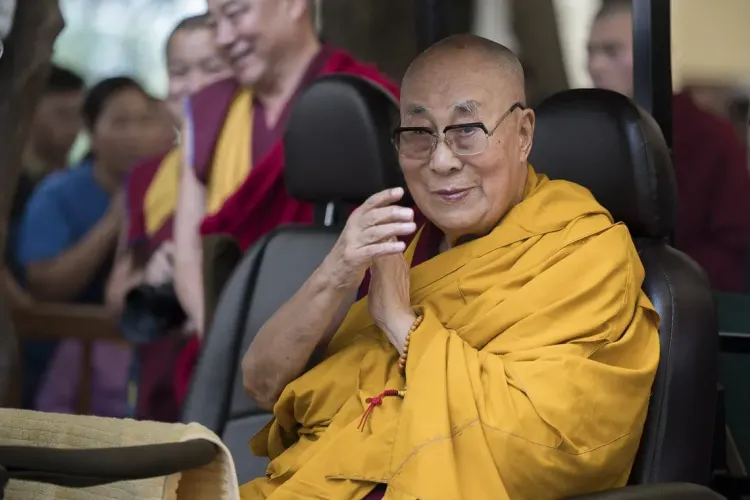Will the Dalai Lama Institution Endure After His Passing?

Synopsis
Key Takeaways
- The Dalai Lama institution will persist beyond his lifetime.
- The Gaden Phodrang Trust holds exclusive recognition rights for future reincarnations.
- The recognition process is based on Tibetan traditions involving spiritual rituals.
- The Dalai Lama emphasizes his dedication to the Tibetan people and their culture.
- Tibetans continue to face challenges in their quest for freedom.
Dharamsala, July 2 (NationPress) The venerable Tibetan spiritual leader, the Dalai Lama, proclaimed on Wednesday that the legacy of the Dalai Lama will persist beyond his lifetime. The Gaden Phodrang Trust holds the exclusive authority to identify the future reincarnation.
Founded with the mission of safeguarding the distinctive Tibetan culture and supporting the Tibetan populace, as well as others in need, the Gaden Phodrang Trust is committed to unity across nationality, faith, and origin.
During a highly anticipated address at the commencement of a three-day Buddhist conference in McLeodganj, a charming hill station near Dharamsala, the spiritual leader stated, "On September 24, 2011, during a gathering of Tibetan spiritual leaders, I conveyed to fellow Tibetans, both in and outside Tibet, as well as followers of Tibetan Buddhism, my thoughts on the continuation of the Dalai Lama institution."
"I made it clear back in 1969 that it is imperative for concerned individuals to decide on the future of the Dalai Lama's reincarnations. I also mentioned that when I reach the age of ninety, I will consult with esteemed Lamas of Tibetan Buddhist traditions, the Tibetan public, and other stakeholders in Tibetan Buddhism to assess whether the institution should continue. Although I have not publicly discussed this matter recently, over the past 14 years, various leaders of Tibet’s spiritual traditions, members of the Tibetan parliament in exile, and other concerned Buddhists from regions including the Himalayan area, Mongolia, and beyond have expressed their heartfelt wishes for the continuation of the Dalai Lama institution," he elaborated.
"Notably, I have received many messages from Tibetans within Tibet echoing this sentiment. In light of these appeals, I affirm that the Dalai Lama institution will indeed persist," he confirmed.
The Nobel Peace Laureate, set to turn 90 on July 6, emphasized in his statement that the procedure for identifying a future Dalai Lama is clearly defined in the September 2011 statement, which asserts that the Gaden Phodrang Trust will bear sole responsibility for this task.
"It is essential that they consult with the various leaders of Tibetan Buddhist traditions and the oath-bound dharma protectors connected to the lineage of the Dalai Lamas. Following past traditions, they should undertake the search and recognition process accordingly. I reaffirm that the Gaden Phodrang Trust solely possesses the authority to recognize the future reincarnation; no other entity has the right to intervene in this matter," he stated.
Tibetan tradition holds that the recognition of a Lama's reincarnation, particularly the Dalai Lama's, is not a matter of appointment but rather a sacred process of visions, signs, and profound spiritual rituals. Only the Dalai Lama holds the legitimate power to identify his successor.
At a celebration marking his upcoming 90th birthday, the Dalai Lama remarked on June 30 to attendees, "Despite my age of 90, I remain in good health. Throughout my life, I have dedicated my efforts to the welfare of Tibetans and the Dharma. I have also fostered relationships globally and engaged in meaningful dialogues with scientists. My life has been fulfilling. I have traveled extensively and met people from all walks of life. I believe my existence has benefited others, and I devote the remainder of my life to serving those in need."
Sixty-six years ago, the 14th Dalai Lama, disguised as a soldier, fled Norbulingka Palace in Tibet—a pivotal moment as he escaped into exile in India following a challenging 14-day journey. Since then, he has been a long-term, respected guest of the Indian government, often expressing gratitude for the freedoms he enjoys while advocating for human values, religious harmony, and the preservation of Tibetan language and culture, a legacy from the masters of India’s Nalanda University.
The Dalai Lama, along with a group of soldiers and cabinet ministers, fled into exile on March 17, 1959, after China suppressed a Tibetan uprising.
In his recent book, ‘In Voice for the Voiceless’, the Dalai Lama shares insights from his extensive interactions with China. This book serves as a reminder of Tibet’s unresolved quest for freedom and the ongoing struggles faced by his people in their homeland. It recounts his remarkable life, illustrating the challenges of losing one’s home to an oppressive force and building a new life in exile, while contemplating the existential crisis of a nation, its people, and its cultural heritage.
He was just 16 years old when Communist China invaded Tibet in 1950, and at 19, he had his first encounter with Chairman Mao in Beijing. By the age of 25, he had fled to India and assumed the role of a leader in exile.
Upon reaching India after a perilous journey, the Dalai Lama first lived for about a year in Mussoorie, Uttarakhand. On March 10, 1960, shortly before relocating to Dharamsala, he remarked: "For us in exile, our focus must be on resettlement and the preservation of our cultural traditions. We, Tibetans, will ultimately succeed in reclaiming our freedom for Tibet."
Currently, India hosts approximately 100,000 Tibetans along with the government-in-exile.
(Vishal Gulati can be contacted at vishal.g@ians.in)









